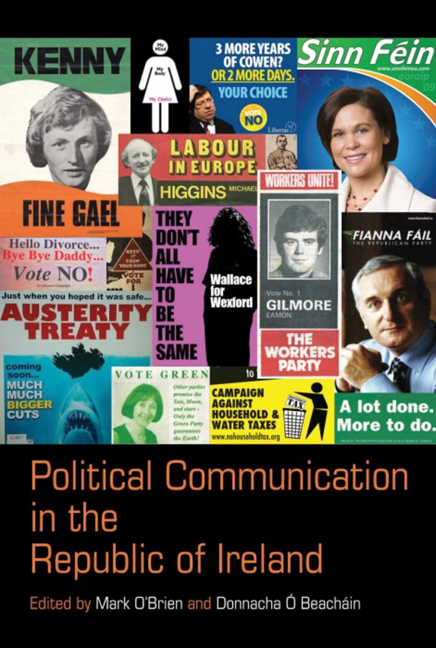Book contents
- Frontmatter
- Contents
- List of Illustrations
- Glossary
- Notes on Contributors
- Acknowledgements
- Introduction
- Part One Political Communication and Politicians
- Part Two Political Communication and Journalism
- Part Three Political Communication and the Public
- 9 A private affair? Lobbying and transparency in modern Ireland
- 10 Equal time for Judas Iscariot? Broadcast treatment of political contests in the Republic of Ireland
- 11 ‘There now follows …’: The role of the party political broadcast and the 2007 ‘peace broadcast’
- 12 Social media and political communication
- 13 Mediating elections in Ireland: evidence from the 2011 general election
- Conclusion
- Index
13 - Mediating elections in Ireland: evidence from the 2011 general election
from Part Three - Political Communication and the Public
- Frontmatter
- Contents
- List of Illustrations
- Glossary
- Notes on Contributors
- Acknowledgements
- Introduction
- Part One Political Communication and Politicians
- Part Two Political Communication and Journalism
- Part Three Political Communication and the Public
- 9 A private affair? Lobbying and transparency in modern Ireland
- 10 Equal time for Judas Iscariot? Broadcast treatment of political contests in the Republic of Ireland
- 11 ‘There now follows …’: The role of the party political broadcast and the 2007 ‘peace broadcast’
- 12 Social media and political communication
- 13 Mediating elections in Ireland: evidence from the 2011 general election
- Conclusion
- Index
Summary
Information is a crucial ingredient in election campaigns. When voters form or change opinions they are widely thought to do so on the basis of information, attention to the information, predispositions, and the interaction of these factors (Zaller, 1992). And voters usually receive most political information, or at least receive it most intensely, during the course of an election campaign. So campaigns should lead to voters reinforcing or changing opinions, which in turn may lead to changes in the vote choice, and this should happen primarily through the media. However, such general arguments may have a limited application to Ireland; politicians may be able to influence voters’ decisions unmediated by news outlets because of the small size of constituencies. A majority of Irish voters are likely to receive direct contact from parties (55% according to the Irish National Election Study (INES), 2011), most often in the form of door-to-door canvassing. Furthermore, decisions might be made before the campaign starts; in 2002 and 2007, 71% and 69% of respondents, respectively, reported that they had made their decision as to which party to give their first preference vote to before the campaign officially started (authors’ analysis of INES 2002 and 2007).
It has been said of Irish general election campaigns that they constitute 40 or so local campaigns rather than one national campaign (Marsh, 2009, 183). Each constituency might hold a separate campaign where the outcome depends on the nature of the local campaign and the impact of local media – something that is surprisingly strong despite the small size of the country. Certainly local issues and grass-roots campaigning are clearly thought to be important by candidates; a fairly typical quote from a candidate in 2007 was ‘I believe that my focus on micro-issues was paramount in my campaign['s success]’ (Flanagan, 2008, 70). Furthermore the electoral system, the single transferable vote (STV), asks voters to rank-order candidates, within and across parties. It pits candidates from the same party against each other for support. Most TDs who lose their seats at elections do so to their party colleagues rather than competitors from other parties (the 2011 election was a rare exception, see Gallagher and Marsh, 2011). Marsh (2000, 489) argues that the electoral system essentially promotes candidate-centred campaigns but also provides incentives for alliances between candidates.
- Type
- Chapter
- Information
- Political Communication in the Republic of Ireland , pp. 217 - 236Publisher: Liverpool University PressPrint publication year: 2014

